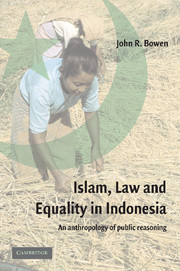Book contents
- Frontmatter
- Contents
- List of illustrations
- List of tables
- Acknowledgments
- Glossary
- Part 1 Village repertoires
- Part 2 Reasoning legally through scripture
- 4 The contours of the courts
- 5 The judicial history of “consensus”
- 6 The poisoned gift
- 7 Historicizing scripture, justifying equality
- Part 3 Governing Muslims through family
- References
- Index
7 - Historicizing scripture, justifying equality
Published online by Cambridge University Press: 07 January 2010
- Frontmatter
- Contents
- List of illustrations
- List of tables
- Acknowledgments
- Glossary
- Part 1 Village repertoires
- Part 2 Reasoning legally through scripture
- 4 The contours of the courts
- 5 The judicial history of “consensus”
- 6 The poisoned gift
- 7 Historicizing scripture, justifying equality
- Part 3 Governing Muslims through family
- References
- Index
Summary
I now turn to a second set of channels and communications between local and national processes of reasoning and deliberation. Whereas in the last chapter we looked at the effects of events judged negative in towns and villages (unfair use of gifts to restrict women's access to resources) on Supreme Court decisions and on the development of rules in the Compilation, here I consider the degree to which participants in national Islamic scholarship consider local patterns to be of positive value. Some Indonesian Muslim scholars have drawn on their knowledge of gender-equal patterns of work and sharing in villages and towns to develop a critique of Islamic law. Others insist on the priority of the textual evidence found in scripture.
At issue in these arguments is the relationship between text and what in the Indonesian case is called “context.” The very fact of revelation that is the proof of Islam's universal message contains a critical ambiguity. Revelation must be made in specific cultural, linguistic, and political surroundings, and the message must be one that can be understood, if not always accepted, in those surroundings. The revelations of Islam were made in Arabic, to people who lived and worked in an urban society, within a broader tribal, and patrilineal, social context. To what extent did the revelations “take account of” that context?
- Type
- Chapter
- Information
- Islam, Law, and Equality in IndonesiaAn Anthropology of Public Reasoning, pp. 147 - 170Publisher: Cambridge University PressPrint publication year: 2003



